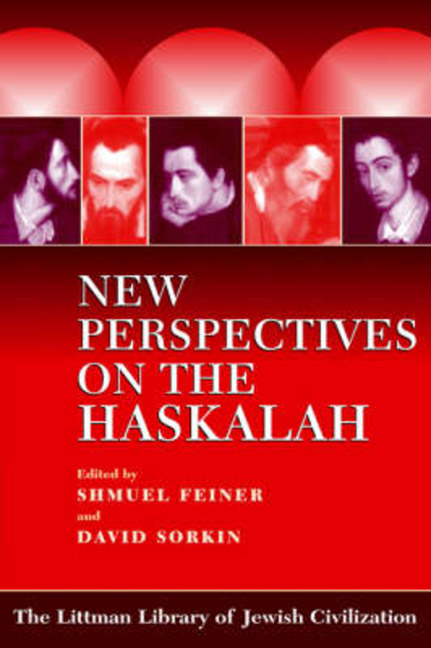Book contents
- Frontmatter
- Preface
- Contents
- Note on Transliteration
- Introduction
- 1 The Early Haskalah
- 2 Naphtali Herz Wessely and the Cultural Dislocations of an Eighteenth-Century Maskil
- 3 Enlightenment Values, Jewish Ethics: The Haskalah's Transformation of the Traditional Musar Genre
- 4 Was there a ‘Haskalah’ in England? Reconsidering an Old Question
- 5 Strategy and Ruse in the Haskalah of Mendel Lefin of Satanow
- 6 The Struggle of the Mitnagedim and Maskilim against Hasidism: Rabbi Jacob Emden and Judah Leib Mieses
- 7 Magic and Miracle-Workers in the Literature of the Haskalah
- 8 Portrait of the Maskil as a Young Man
- 9 Reality and its Refraction in Descriptions of Women in Haskalah Fiction
- 10 Enlightened Rabbis as Reformers in Russian Jewish Society
- 11 Towards a Historical Definition of the Haskalah
- Glossary
- Notes on Contributors
- Bibliography
- Index
8 - Portrait of the Maskil as a Young Man
- Frontmatter
- Preface
- Contents
- Note on Transliteration
- Introduction
- 1 The Early Haskalah
- 2 Naphtali Herz Wessely and the Cultural Dislocations of an Eighteenth-Century Maskil
- 3 Enlightenment Values, Jewish Ethics: The Haskalah's Transformation of the Traditional Musar Genre
- 4 Was there a ‘Haskalah’ in England? Reconsidering an Old Question
- 5 Strategy and Ruse in the Haskalah of Mendel Lefin of Satanow
- 6 The Struggle of the Mitnagedim and Maskilim against Hasidism: Rabbi Jacob Emden and Judah Leib Mieses
- 7 Magic and Miracle-Workers in the Literature of the Haskalah
- 8 Portrait of the Maskil as a Young Man
- 9 Reality and its Refraction in Descriptions of Women in Haskalah Fiction
- 10 Enlightened Rabbis as Reformers in Russian Jewish Society
- 11 Towards a Historical Definition of the Haskalah
- Glossary
- Notes on Contributors
- Bibliography
- Index
Summary
THE VISION OF THE HASKALAH AS EXPERIENCED BY THE YOUNG JEW
THE process of modernization that began to penetrate east European Jewish society at the end of the eighteenth century, and which reached its zenith during the nineteenth, stimulated the growth and development of the Haskalah movement there. As a historical phenomenon, the Haskalah has engaged the attention of scholars from a number of disciplines; in this chapter I will take a different approach, monitoring change as it occurred at the level of the individual, in the souls and minds of the young men who were attracted to the movement.
Evidence can be found in a variety of sources. The struggles and doubts of young men trying to realize the Haskalah's ideals are reflected in the biographical, autobiographical, and memoir-style compositions and epistolary literature of the period, and also in fictional form, in stories, novels, satire, and epic poetry. Certain motifs are repeated again and again in different contexts. There is, for example, the youth of the figures peopling this material, swept up by the idea of the Haskalah during their adolescence or the early years of marriage; here are described the stages of ideological transformation, the gradual transition from the traditional Jewish study system to the world of secular education, a change brought about mainly by the key texts of the Haskalah. Another motif is the role played by fellow students or by teachers who helped and encouraged the budding maskilim with persuasive conversation and books. These guides included mature maskilim, some of them respected and wealthy figures in the Jewish community, who advised young novices seeking a secular education or planning to travel to foreign parts, sometimes offering financial support. In this connection, we must note the phenomenon of the young men who drifted to the cities of Russia, or who travelled further afield to western Europe in order to continue their studies. The odds that they would go back to their homeland and their home town were slim. Optimistic writers picture them returning as bearers of authoritative, reforming influence, acquired as a result of the professional and intellectual status achieved during their absence from the community, but others show them settling abroad after having completed their advanced studies.
- Type
- Chapter
- Information
- New Perspectives on the Haskalah , pp. 128 - 143Publisher: Liverpool University PressPrint publication year: 2001



